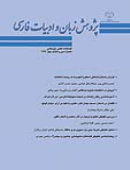گفتمان در داستان «مسجد مهمان¬كش» مثنوي با تکیه بر آرای «میشل فوکو»
محورهای موضوعی : Research in Iranian classical literatureعلي دهقان 1 , نازيلا يخدانساز 2
1 - دlنشگاه آزاد اسلامی واحد تبریز
2 - دانشگاه آزاد واحد تبریز
کلید واژه: مثنوی معنوی مسجد مهمانکش میشل فوکو گفتمان قدرت,
چکیده مقاله :
زبان و گفتمان، دو عنصر مهم زندگی هستند که گاه موجب زايش عناصر دیگری ميشوند. از جمله اين عناصر، مقولة «قدرت» است كه به نوبة خود موجد برخي فرآيندهاي ديگر مانند «تهديد»، «مقاومت»، «ملامت» و «وحشت» ميشود. مولانا جلاالدين محمد بلخي، شاعر بنام قرن هفتم هجري، توانسته است در خلال اشعار عارفانه، گفتمانهاي فرهنگي، سياسي و عقيدتي عصر خود را هنرمندانه و نامحسوس از زبان اشخاص داستان های مثنوی بیان کند. هدف و قلمرو اصلي اين تحقيق، بررسي يك نمونه از داستانهاي مثنوي مولانا از ديدگاه تاريخ گرايي نوين و روشن كردن ويژگي و كاركردهاي آن در محدودة تعريف جديدي است كه ميشل فوكو - فيلسوف فرانسوي - از آن ارائه ميدهد. گفتمانهای بحث شده در اين جُستار، نشان دهندة تكثر قدرت در متن داستان مورد مطالعه و به تبع آن در زمان مولوي است. زبان نيز مانند ابزار قدرت در روابط شخصيتهاي داستان و جامعه، عامل اقتدار به شمار می آید. در این ميان خرافه پرستي و خرافه بافی، پررنگترين گفتمان بوده، رمز اصلی داستان «مسجد مهمان كش» به شمار ميآيد. بر مبنای گفتمان مورد مطالعه، مولوي در دياري به سر ميبرد كه غبار تيرگيها، فضای جامعه را در برگرفته بود. این حكايت رازآميز، حساسیت مولوی را نسبت به چنین فضایی آشكار كرده است.
Language and discourse are the two important elements of life that sometimes generate other elements. One of these elements is the category of “power” which itself is the cause of the creation of other processes like “threat”, “resistance”, “blame”, and “terror”. Molana Jalal Adin Mohammad Balkhi, the great poet of seventh century (AH), has been able to state the cultural, political and ideological discourses of that time in an artistic and implicit way through the characters of Masnavi stories. The main goal and domain of this research is to analyze one of the stories in Masnavi from the recent historicism point of view to shed light on its features and functions within the new definition that Michel Foucault, the French philosopher, has proposed. The discourses discussed in this research indicate the plurality of power in texts of the stories under study, and consequently in Molavi’s era. Language as a power tool is considered to be a power factor in the relationship between story characters and the society. Believe in superstition and encouraging it is considered to be the main discourse and the main code in “The Guest- Killing Mosque”. According to the discourse under studied, Molavi lives in a society which is covered by the dust of darkness. This mysterious fable reveals Molavi’s concern for such atmosphere.


